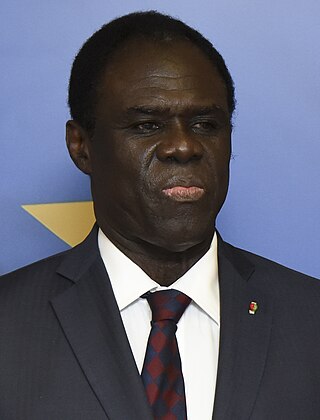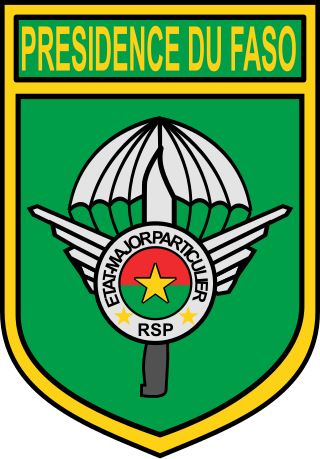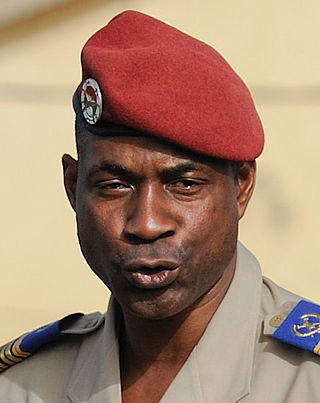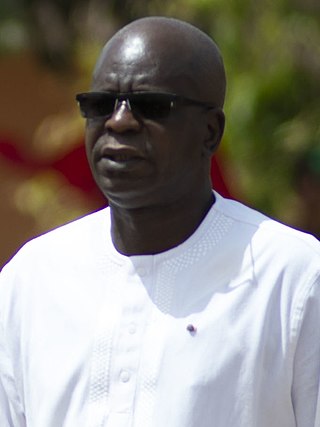| |||||
| Decades: | |||||
|---|---|---|---|---|---|
| See also: | |||||
The following lists events that happened during 2014 in Burkina Faso.
| |||||
| Decades: | |||||
|---|---|---|---|---|---|
| See also: | |||||
The following lists events that happened during 2014 in Burkina Faso.

The Politics of Burkina Faso takes place in a framework of a semi-presidential republic, whereby the Prime Minister of Burkina Faso is the head of government, and of a multi-party system. The President of Burkina Faso is the head of state. Executive power is exercised by both the President and the Government. Legislative power is vested in both the government and parliament. The party system was dominated by the Congress for Democracy and Progress (CDP) until 2014. Burkina Faso's CDP fell victim to a series of demonstrations and riots, to alter the constitution and extend the former president's term in office - referred to as the 2014 Burkinabé uprising. The military then declared itself to be in power and the state shifted to an electoral autocracy. Burkina Faso lacks the foundation that would support a democracy, with its current transition to a military regime, but not all hope is lost. After an internal coup ousted Paul-Henri Sandaogo Damiba, the previous military head of state, a new transitional charter was adopted, naming Captain Ibrahim Traoré as president. Mr. Damiba's progressional failures on the state's security front “swung a majority of domestic opinion in favour of the MPSR”. Mr. Traoré pledged a major reinforcement of armed forces to strengthen frontline units and recruited over 3,000 more troops. As the violence becomes so entrenched, it is nonetheless expected that the security situation will remain dire in the medium term. “However, we expect that elections will still be held in 2024 as part of the army's plan to stabilise the security situation by boosting counter-terrorism operations.”

The history of Burkina Faso includes the history of various kingdoms within the country, such as the Mossi kingdoms, as well as the later French colonisation of the territory and its independence as the Republic of Upper Volta in 1960.

Blaise Compaoré is a Burkinabé-Ivorian former politician who served as the second president of Burkina Faso from 1987 to 2014. He was a close associate of the first president, Thomas Sankara, during the 1980s and in October 1987 he led a coup d'état during which Sankara was killed. Subsequently, he introduced a policy of 'rectification', overturning the leftist and Third Worldist policies pursued by Sankara. He won elections in 1991, 1998, 2005, and 2010, in what were considered unfair circumstances. His attempt to amend the constitution to extend his 27-year term caused the 2014 Burkinabé uprising. On 31 October 2014, Compaoré resigned, whereupon he fled to the Ivory Coast. In April 2022, he was found guilty by a special military tribunal of complicity in Sankara’s murder. He is also the longest-serving president of Burkina Faso.

Pô is a city in southern Burkina Faso. It is the capital of the province of Nahouri. The main ethnic group is the Kasséna, a group close to the Gurunsi. It is said to have been founded in around 1500 and is home to an army base, including the Académie militaire Georges Namoano.

Michel Kafando is a Burkinabé diplomat who served as the transitional President of Burkina Faso from 2014 to 2015. He served in the government as Minister of Foreign Affairs from 1982 to 1983 and was the Permanent Representative (Ambassador) of Burkina Faso to the United Nations from 1998 to 2011.

General elections were held in Burkina Faso on 29 November 2015. The elections were the first national elections in the country since the 2014 Burkinabé uprising and the departure of President Blaise Compaoré, who had ruled Burkina Faso for 27 years. The party of former President Compaoré, the Congress for Democracy and Progress, was banned from presenting a presidential candidate in the presidential elections but was still able to participate in the parliamentary election.

The 2014 Burkina Faso uprising was a series of demonstrations and riots in Burkina Faso in October 2014 that quickly spread to multiple cities. They began in response to attempts at changing the constitution to allow President Blaise Compaoré to run again and extend his 27 years in office. Pressure for political change came from civil society and in particular from the country's youth. Following a tumultuous day on 30 October, which included the involvement of former Defence Minister Kouamé Lougué and the burning of the National Assembly and other government buildings as well as the ruling Congress for Democracy and Progress party's headquarters, Compaoré dissolved the government and declared a state of emergency before eventually fleeing to Côte d'Ivoire with the support of Ivorian President Alassane Ouattara.

General Honoré Nabéré Traoré is a Burkinabé soldier who assumed leadership of Burkina Faso immediately after the resignation of Blaise Compaoré amidst the 2014 Burkinabé uprising. He served for one day, before he and other officials from the interim military administration declared Isaac Zida to be Interim Head of State until power could be handed over to a civilian government that would oversee elections.

Yacouba Isaac Zida is a Burkinabé military officer who briefly served as Burkina Faso's interim head of state in November 2014. He took power in the aftermath of the 2014 Burkinabé uprising, sidelining a more senior officer, Honoré Nabéré Traoré. A few weeks later, a civilian, Michel Kafando, was chosen to replace Zida as transitional head of state; Kafando then appointed Zida as Prime Minister on 19 November 2014.

Burkina Faso–Taiwan relations referred to the historical relationship between the Republic of China (Taiwan) and Burkina Faso. Taiwan had an embassy in Ouagadougou, and Burkina Faso had an embassy in Taipei. In May 2018, Burkina Faso switched to recognize the People's Republic of China, thus ending diplomatic ties with Taiwan. The last ambassador of Burkina Faso to Taiwan, appointed in August 2017, was Aminata Sana Congo.
Le Balai Citoyen, is a political grassroots movement in Burkina Faso, which was part of the opposition against President Blaise Compaoré. It was co-founded by two musicians, reggae artist Sams’K Le Jah and rapper Serge Bambara ('Smockey') in the Summer of 2013. They organized several protests in early 2014, for example hosting a joint rally with the newly formed Movement of People for Progress, filling a 35,000-capacity sports stadium to its rafters.
Serge Bambara is a hip hop artist, actor and political activist from Ouagadougou, the capital of Burkina Faso. Born in what was then the Republic of Upper Volta, the son of a Bissa father and a French mother, he moved to France to study in 1991. In 1999 he signed a contract with EMI and launched a first single, featuring the singer Lââm. In 2001 he moved back to Burkina Faso and started the studio Abazon. He has released the albums Epitaphe, Zamana, Code noir and Cravate Costards et Pourriture, and cooperated with the prominent Senegalese rapper Didier Awadi.

The Regiment of Presidential Security, sometimes known as the Presidential Security Regiment, was the secret service organisation responsible for VIP security to the President of Burkina Faso, a landlocked country in West Africa. It was autonomous from the Army. Until 31 October 2014, the President was Blaise Compaoré, a military officer who came to power in a 1987 coup d'état. The elite unit was well known for its frequent involvement in the politics of Burkina Faso, acting as the iron fist of President Compaoré in his domination of the country. They were said to be widely feared by many people in the country, which in 2012 – two years prior to the end of Compaoré's government – was described by the Democracy Index as an "authoritarian regime".
The following lists events that happened during 2015 in Burkina Faso.

The 2015 Burkina Faso coup d'état attempt was a failed coup d'état launched on 16 September 2015 in Burkina Faso, when members of the Regiment of Presidential Security (RSP) – a controversial autonomous military unit, formed under President Blaise Compaoré – detained the country's government. Among those detained were the transitional President Michel Kafando, Prime Minister Yacouba Isaac Zida, and numerous members of the cabinet. This transitional government was formed in the wake of the 2014 Burkinabé uprising, when a popular movement overthrew the long-time president Compaoré, who himself had come to power in a 1987 coup against the left-wing leader Thomas Sankara. New general elections were planned for 11 October 2015.

Gilbert Diendéré is a Burkinabé military officer and the Chairman of the National Council for Democracy, the military junta that briefly seized power in Burkina Faso in the September 2015 coup d'état. He was a long-time aide to President Blaise Compaoré, serving as commander of the Regiment of Presidential Security (RSP) during Compaoré's rule. He was appointed as chairman of the junta on 17 September 2015. Diendéré currently serves a prison sentence for his role in the 1987 killing of Thomas Sankara and the 1990 killing of Dabo Boukary.
The National Council for Democracy, led by Chairman-General Gilbert Diendéré, was the ruling cabinet of the military junta of Burkina Faso from 17 to 23 September 2015. It took temporary control of the preceding cabinet led by Interim President Michel Kafando in the 2015 Burkinabé coup d'état.

Chérif Moumina Sy is a Mauritanian-born Burkinabé politician who served as the transitional Head of Parliament from 2014 to 2015.

Damo Justin Baro, also known as Justin Damo Barro, is a Burkinabe economist and politician who served as Minister of Finance between 1983 and 1986 under Thomas Sankara. During that time, he was President of ECOWAS' Council of Ministers. In the 1990s, he served in the World Bank, and later helped create the West African Economic and Monetary Union.